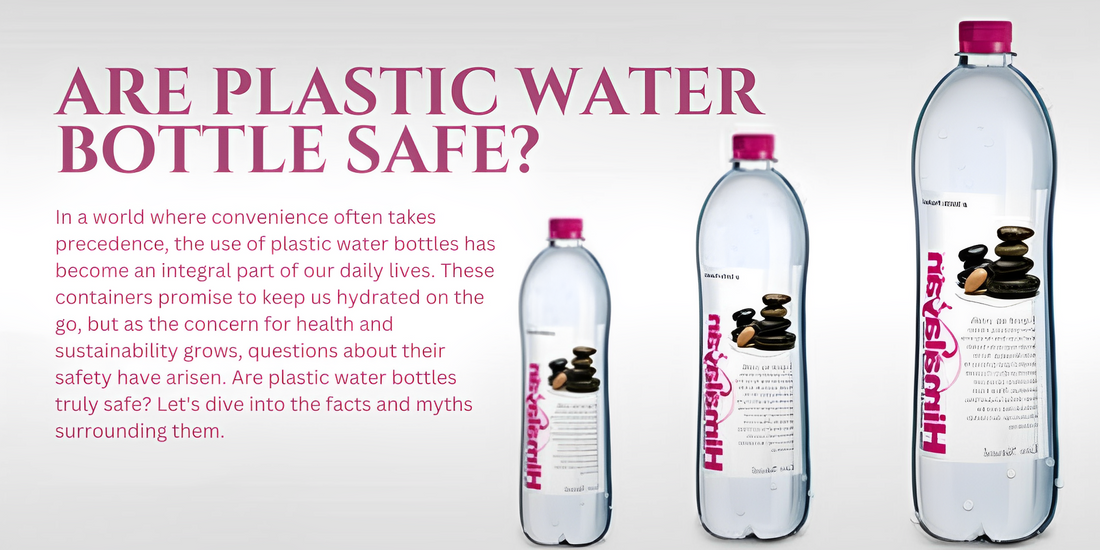
Are Plastic Water Bottle Safe?
Plastic water bottles have become a staple in our lives, offering a convenient way to quench our thirst wherever we are. But underneath this convenience lies a question: Are these bottles safe for our health and the environment? Let's embark on a journey to uncover the truth about mineral water bottles and their impact on our lives.
2. Understanding Plastic Types
Not all plastics are created equal. You might have noticed the numbers printed on the bottom of plastic bottles – those are resin identification codes. These codes indicate the type of plastic used in the bottle's production. The most common types are PET (#1) and HDPE (#2). PET bottles are widely used for water and beverages due to their lightweight nature, while HDPE bottles are often used for milk and detergents.
3. The Concerns with BPA
BPA, or bisphenol A, has been a topic of concern in the plastic industry. Found in some plastic bottles, BPA is believed to have potential health risks, especially when exposed to heat or over time. As a result, many manufacturers have shifted to BPA-free bottles to address these worries and provide safer options.
4. Exploring Mineral Water
Mineral water, sourced from natural springs, is rich in minerals like calcium, magnesium, and potassium. These minerals not only contribute to hydration but also offer potential health benefits. However, the packaging of mineral water, often in plastic bottles, raises questions about the safety of the water itself.
5. The Safety of Plastic Water Bottles
The safety of plastic water bottles depends on various factors, including the type of plastic used, storage conditions, and handling. While PET bottles are generally considered safe for one-time use, reusing them might expose you to harmful chemicals. It's important to wash and store these bottles properly to minimize any potential risks.
6. Environmental Impact
Beyond health concerns, the environmental impact of plastic water bottles cannot be ignored. These bottles contribute to plastic waste that litters our oceans and landscapes. Recycling helps, but it's not a foolproof solution. Many plastic bottles still end up in landfills or as pollution.
7. Sustainable Alternatives
Thankfully, alternatives to single-use plastic water bottles are emerging. Stainless steel, glass, and even biodegradable materials offer safer and more eco-friendly options. By choosing these alternatives, you can reduce your carbon footprint and make a positive impact on the planet.
8. Tips for Using Plastic Water Bottles Safely
If you choose to use plastic water bottles, here are some tips to ensure your safety:
- Avoid Sunlight and Heat: Exposing plastic bottles to sunlight and heat can accelerate the release of chemicals into the water.
- Stay Hydrated on Time: Drink the water within the recommended time to prevent bacterial growth.
- Hand Wash Only: If you reuse plastic bottles, hand wash them with mild soap and water.
- Skip the Dishwasher: Dishwashers can damage plastic bottles and increase the risk of chemical leaching.
- Recycle Responsibly: If you decide to recycle, make sure to follow proper recycling guidelines.
9. Mythbusting: Plastic Recycling
Recycling plastic bottles might seem like a solution, but it's not without challenges. The process can be energy-intensive, and not all plastic bottles are created with recyclable materials. Additionally, the demand for recycled plastic is often lower than the supply, leading to excess waste.
10. Conclusion
In the world of plastic water bottles, safety and sustainability go hand in hand. While plastic bottles can be convenient, they also come with potential health and environmental risks. By understanding the different plastic types, opting for BPA-free alternatives, and embracing sustainable options, you can make informed choices that benefit both you and the planet.
FAQs About Plastic Water Bottle Safety
Q1: Can I reuse plastic water bottles?
A1: While reusing plastic water bottles might be convenient, it's important to do so cautiously. Plastic can degrade over time, potentially releasing harmful chemicals into the water.
Q2: Are stainless steel water bottles a safer option?
A2: Yes, stainless steel water bottles are considered a safer and more durable alternative to plastic. They are less likely to leach chemicals and can be reused without concern.
Q3: Can plastic bottles be microwaved?
A3: It's generally not recommended to microwave plastic bottles. Heat can cause plastic to release harmful chemicals into the water or deform the bottle.
Q4: Are there any health benefits to drinking mineral water?
A4: Yes, mineral water can provide essential minerals that contribute to overall health. However, make sure to choose reputable brands and check the packaging for safety.
Q5: How can I reduce my plastic waste?
A5: You can reduce plastic waste by using reusable water bottles made from materials like stainless steel or glass. Additionally, practicing responsible recycling and supporting plastic reduction initiatives can make a difference.
